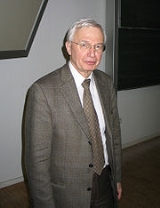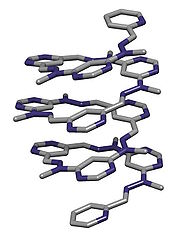
Jean-Marie Lehn
Encyclopedia
Jean-Marie Lehn is a French
chemist
. He received the Nobel Prize
together with Donald Cram and Charles Pedersen in 1987 for his work in Chemistry
, particularly his synthesis of the cryptand
s. Lehn was an early innovator in the field of supramolecular chemistry
, i.e., the chemistry of host-guest molecular assemblies created by intermolecular interactions, and continues to innovate in this field. He has published in excess of 800 peer-reviewed articles in chemistry literature.


, France
to Pierre and Marie Lehn. His father was a baker, but because of his interest for music, he later became the city organist. Lehn also studied music, saying that it became his major interest after science. He has continued to play the organ throughout his professional career as a scientist. His high school studies in Obernai, from 1950 to 1957, included Latin, Greek, German, and English languages, French literature, and he later became very keen of both philosophy and science, particularly chemistry
. In July 1957, he obtained the baccalauréat in philosophy
, and in September of the same year, the baccalauréat in Natural Sciences.
At the University of Strasbourg
, although he considered studying philosophy, he ended up taking courses in physical, chemical and natural sciences, attending the lectures of Guy Ourisson, and realizing that he wanted to pursue a research career in organic chemistry. He joined Ourisson's lab, working his way to the Ph.D. There, he was in charge of the lab's first NMR spectrometer, and published his first scientific paper, which pointed out an additivity rule for substituent induced shifts of proton NMR signals in steroid derivatives. He obtained his Ph.D., and went to work for a year at Robert Burns Woodward
's laboratory at Harvard University
, working among other things on the synthesis of vitamin B12
.
. His research focused on the physical properties of molecules, synthesizing compounds specifically designed for exhibiting a given property, in order to better understand how that property was related to structure.
In 1968, he achieved the synthesis of cage-like molecules, comprising a cavity inside which another molecule could be lodged. Organic chemistry enabled him to engineer cages with the desired shape, thus only allowing a certain type of molecule to lodge itself in the cage. This was the premise for an entire new field in chemistry, sensors. Such mechanisms also play a great role in molecular biology.
These cryptands, as Lehn dubbed them, became his main center of interest, and led to his definition of a new type of chemistry, "supramolecular chemistry", which instead of studying the bonds inside one molecule, looks at intermolecular attractions, and what would be later called "fragile objects", such as micelles, polymers, or clays.
In 1980, he was elected to become a teacher at the prestigious Collège de France
, and in 1987 was awarded the Nobel Prize, alongside Donald Cram and Charles Pedersen for his works on cryptands.
France
The French Republic , The French Republic , The French Republic , (commonly known as France , is a unitary semi-presidential republic in Western Europe with several overseas territories and islands located on other continents and in the Indian, Pacific, and Atlantic oceans. Metropolitan France...
chemist
Chemist
A chemist is a scientist trained in the study of chemistry. Chemists study the composition of matter and its properties such as density and acidity. Chemists carefully describe the properties they study in terms of quantities, with detail on the level of molecules and their component atoms...
. He received the Nobel Prize
Nobel Prize
The Nobel Prizes are annual international awards bestowed by Scandinavian committees in recognition of cultural and scientific advances. The will of the Swedish chemist Alfred Nobel, the inventor of dynamite, established the prizes in 1895...
together with Donald Cram and Charles Pedersen in 1987 for his work in Chemistry
Chemistry
Chemistry is the science of matter, especially its chemical reactions, but also its composition, structure and properties. Chemistry is concerned with atoms and their interactions with other atoms, and particularly with the properties of chemical bonds....
, particularly his synthesis of the cryptand
Cryptand
Cryptands are a family of synthetic bi- and polycyclic multidentate ligands for a variety of cations. The Nobel Prize for Chemistry in 1987 was given to Donald J. Cram, Jean-Marie Lehn, and Charles J. Pedersen for their efforts in discovering and determining uses of cryptands and crown ethers,...
s. Lehn was an early innovator in the field of supramolecular chemistry
Supramolecular chemistry
Supramolecular chemistry refers to the area of chemistry beyond the molecules and focuses on the chemical systems made up of a discrete number of assembled molecular subunits or components...
, i.e., the chemistry of host-guest molecular assemblies created by intermolecular interactions, and continues to innovate in this field. He has published in excess of 800 peer-reviewed articles in chemistry literature.


Early years
Lehn was born in RosheimRosheim
Rosheim is a commune in the Bas-Rhin department in Alsace in north-eastern France.It lies southwest of Strasbourg, on the eastern slopes of the Vosges mountains...
, France
France
The French Republic , The French Republic , The French Republic , (commonly known as France , is a unitary semi-presidential republic in Western Europe with several overseas territories and islands located on other continents and in the Indian, Pacific, and Atlantic oceans. Metropolitan France...
to Pierre and Marie Lehn. His father was a baker, but because of his interest for music, he later became the city organist. Lehn also studied music, saying that it became his major interest after science. He has continued to play the organ throughout his professional career as a scientist. His high school studies in Obernai, from 1950 to 1957, included Latin, Greek, German, and English languages, French literature, and he later became very keen of both philosophy and science, particularly chemistry
Chemistry
Chemistry is the science of matter, especially its chemical reactions, but also its composition, structure and properties. Chemistry is concerned with atoms and their interactions with other atoms, and particularly with the properties of chemical bonds....
. In July 1957, he obtained the baccalauréat in philosophy
Philosophy
Philosophy is the study of general and fundamental problems, such as those connected with existence, knowledge, values, reason, mind, and language. Philosophy is distinguished from other ways of addressing such problems by its critical, generally systematic approach and its reliance on rational...
, and in September of the same year, the baccalauréat in Natural Sciences.
At the University of Strasbourg
Strasbourg
Strasbourg is the capital and principal city of the Alsace region in eastern France and is the official seat of the European Parliament. Located close to the border with Germany, it is the capital of the Bas-Rhin département. The city and the region of Alsace are historically German-speaking,...
, although he considered studying philosophy, he ended up taking courses in physical, chemical and natural sciences, attending the lectures of Guy Ourisson, and realizing that he wanted to pursue a research career in organic chemistry. He joined Ourisson's lab, working his way to the Ph.D. There, he was in charge of the lab's first NMR spectrometer, and published his first scientific paper, which pointed out an additivity rule for substituent induced shifts of proton NMR signals in steroid derivatives. He obtained his Ph.D., and went to work for a year at Robert Burns Woodward
Robert Burns Woodward
Robert Burns Woodward was an American organic chemist, considered by many to be the preeminent organic chemist of the twentieth century...
's laboratory at Harvard University
Harvard University
Harvard University is a private Ivy League university located in Cambridge, Massachusetts, United States, established in 1636 by the Massachusetts legislature. Harvard is the oldest institution of higher learning in the United States and the first corporation chartered in the country...
, working among other things on the synthesis of vitamin B12
Vitamin B12
Vitamin B12, vitamin B12 or vitamin B-12, also called cobalamin, is a water-soluble vitamin with a key role in the normal functioning of the brain and nervous system, and for the formation of blood. It is one of the eight B vitamins...
.
Career
In 1966, he was appointed a position as maître de conférences (assistant professor) at the Chemistry Department of the University of StrasbourgUniversity of Strasbourg
The University of Strasbourg in Strasbourg, Alsace, France, is the largest university in France, with about 43,000 students and over 4,000 researchers....
. His research focused on the physical properties of molecules, synthesizing compounds specifically designed for exhibiting a given property, in order to better understand how that property was related to structure.
In 1968, he achieved the synthesis of cage-like molecules, comprising a cavity inside which another molecule could be lodged. Organic chemistry enabled him to engineer cages with the desired shape, thus only allowing a certain type of molecule to lodge itself in the cage. This was the premise for an entire new field in chemistry, sensors. Such mechanisms also play a great role in molecular biology.
These cryptands, as Lehn dubbed them, became his main center of interest, and led to his definition of a new type of chemistry, "supramolecular chemistry", which instead of studying the bonds inside one molecule, looks at intermolecular attractions, and what would be later called "fragile objects", such as micelles, polymers, or clays.
In 1980, he was elected to become a teacher at the prestigious Collège de France
Collège de France
The Collège de France is a higher education and research establishment located in Paris, France, in the 5th arrondissement, or Latin Quarter, across the street from the historical campus of La Sorbonne at the intersection of Rue Saint-Jacques and Rue des Écoles...
, and in 1987 was awarded the Nobel Prize, alongside Donald Cram and Charles Pedersen for his works on cryptands.
Personal life
Lehn was wed in 1965 to Sylvie Lederer, and together they have two sons, David and Mathias.Honours and awards
- Nobel Prize in ChemistryNobel Prize in ChemistryThe Nobel Prize in Chemistry is awarded annually by the Royal Swedish Academy of Sciences to scientists in the various fields of chemistry. It is one of the five Nobel Prizes established by the will of Alfred Nobel in 1895, awarded for outstanding contributions in chemistry, physics, literature,...
(1987) - Commander of the Légion d'HonneurLégion d'honneurThe Legion of Honour, or in full the National Order of the Legion of Honour is a French order established by Napoleon Bonaparte, First Consul of the Consulat which succeeded to the First Republic, on 19 May 1802...
(1996) - Officer of the Ordre National du MériteOrdre National du MériteThe Ordre national du Mérite is an Order of State awarded by the President of the French Republic. It was founded on 3 December 1963 by President Charles de Gaulle...
(1993) - Knight of the Ordre des Palmes AcadémiquesPalmes académiquesThe Ordre des Palmes Académiques is an Order of Chivalry of France for academics and cultural and educational figures...
(1989) - Österreichisches Ehrenzeichen für Wissenschaft und Kunst, (first class) (2001)
- ISA Medal for Science, (2007)
External links
- Nobel Prize Biography
- Jean-Marie Lehn, "The Science and Art of Matter" in UNESCO Courier: "Chemistry and life", January–March 2011

